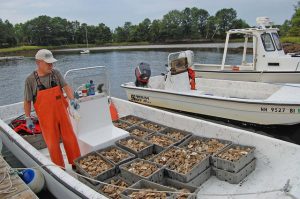Ocean and Coastal Acidification in Maine
Institution: University of Maine
Sponsor: Senator George J. Mitchell Center for Sustainability Solutions
Expanding community resilience through citizen science, outreach, and education
 Ocean and coastal acidification (OCA) presents a unique set of chronic sustainability challenges at the human-ecological interface along the coast of Maine. It threatens the livelihoods of coastal communities through its current and future negative impacts on commercially important species such as oysters, clams, and lobsters and the delivery of ecosystem services like controllng climate and disease.
Ocean and coastal acidification (OCA) presents a unique set of chronic sustainability challenges at the human-ecological interface along the coast of Maine. It threatens the livelihoods of coastal communities through its current and future negative impacts on commercially important species such as oysters, clams, and lobsters and the delivery of ecosystem services like controllng climate and disease.
Ocean and coastal acidification is primarily driven by global carbon dioxide emissions caused by human activity. However, recent evidence has made it clear that local-scale factors are also important: low alkalinity river runoff, excessive nutrients in water bodies, and the intrusion of deep ocean waters can exacerbate localized coastal acidification.
Maine is particularly vulnerable because of its position in the Gulf of Maine, which has a lot of freshwater inflow and is very cold. Both of those physical factors mean we’re already close to the edge compared to other locations dealing with ocean acidification. From the social perspective, Maine has communities that are heavily reliant on fisheries like commercially important shellfisheries; shellfish are particularly susceptible to ocean acidification.
There are no easy, comprehensive policy or social solutions with respect to ocean acidification, yet scientists know that addressing ocean and coastal acidification—through mitigation, adaptation or remediation activities—at local scales is possible.
Doing so requires sustained coordinated activities among citizens, scientists, non-profit organizations, industry, and regulatory agencies. Such coordinated activities, when facilitated by groups and individuals that span organizational and cultural boundaries, can help catalyze the creation of a solutions-oriented community.
Establishing standardized coastal acidification monitoring efforts using citizen scientists
This project will establish standardized coastal acidification monitoring efforts by such a solutions-oriented community—with volunteer citizen scientists at its core.
The effort builds on Maine having taken a lead role on the issue. In 2014, Maine became only the second state in the U.S. (Washington was first) to create an ocean acidification commission. However, unlike Washington, the state legislature in Maine did not create a funded council to carry out the work, which in turn led to the formation of the Maine Ocean and Coastal Acidification Partnership (MOCA)—a volunteer network of scientists, educators and conservation organizations seeking to implement the Maine study commission’s recommendations.
Maine has a robust network of citizen scientist coastal water quality monitors already in place that are committed to this effort. Thus, to help address the stakeholder-identified need for guidance, accessibility, and standardization of monitoring protocols and to advance the capacity to mitigate OCA, this project will work with stakeholders to create a comprehensive education, outreach, training and curriculum development project to enhance and support community-based citizen science acidification monitoring networks in Maine.
This project, conceived out of an identified need by stakeholders in the OA management community, and broadly supported by conservationists, federal agencies, and scientists, is fundamentally aligned with the Mitchell Center’s mission and vision. In particular, this project seeks to co-create new ways to link knowledge to action in a manner that recognizes multiple viewpoints and needs.
Team Leader
Aaron Strong, University of Maine, Assistant Professor of Marine Policy, School of Marine Sciences, aaron.strong@maine.edu
Team Members
Parker Gassett, Dual-Degree Masters Student in Marine Policy and Marine Science, School of Marine Sciences, University of Maine, parker.gassett@maine.edu
Esperanza Stancioff, Associate Extension Professor, Cooperative Extension and Maine Sea Grant, University of Maine, and Chair, Northeast Coastal Acidification Network Education and Outreach Committee, and Steering Committee Member, Maine Ocean and Coastal Acidification Partnership, esp@maine.edu
Damian C. Brady, Assistant Professor of Marine Sciences, School of Marine Sciences; Associate Research Director, Maine Sea Grant, University of Maine, damian.brady@maine.edu
Resources
Parker Gassett: Coming home to help ‘craft the best possible future for Maine’ (August 2021)
